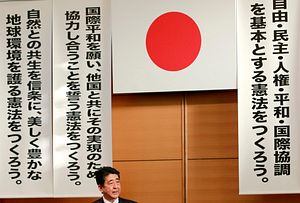When Steve Bannon, Donald Trump’s former adviser, spoke at the conference of the Japanese Conservative Union, he praised Prime Minister Shinzo Abe, calling him a “Trump before Trump.” Bannon is not the only Western right-winger to admire Japan. Simone di Stefano, leader of Italy’s neofascist Casa Pound, is dreaming of an alliance between Italy, Russia, and Japan. And for Jan Moldenhauer, an ideologue of the xenophobic Alternative for Germany, when it comes to immigration, “Japan is the alternative.”
Coming from the world’s self-appointed populist leaders, these statements deserve reflection. Right-wing populism is often seen as a threat to democracy because it challenges the political establishment from the margins, using high doses of nationalism and skillful manipulation of the media. This has happened in Europe, most recently in Italy and Slovakia. But this pattern should not make us forget that the political establishment is hardly immune to right-wing agendas.
In Japan, populist and extreme right-wing nationalism has found an institutional home within the traditional conservatism of Liberal Democratic Party that aims for an authoritarian transformation of the political system — hence the effusions of the likes of Bannon.
Since 2012, Abe has gradually enforced a hard right-wing agenda from within. He has impeccable nationalistic credentials. He is a special adviser of the Nippon Kaigi, a right-wing organization that strives to reconstruct Japan on a nationalist basis. It is active, for example, in advising the government on education policies, promoting ideas about “morals” as well as revisionist history textbooks.
Nippon Kaigi is influential in the LDP. At some point 18 out of 20 of Abe’s cabinets were members, many of whom with clear ultra-right sympathies. One, Tomomi Inada, then party policy chief, had posed for a photo with Yamada Kazunari, the leader of a neo-Nazi group. Another, Taro Aso, the deputy prime minister, remarked that Hitler was wrong in murdering millions of people, but that “his motives were right.” He is also on the record for saying that the Nazis did a good job at gutting the Weimar Constitution — a remarkable statement for a government that wants to alter its own constitution.
Since 2012, Abe’s governments have been pushing policies that are still only on the agenda of many populists. Take the attacks on the media, for example. When Abe was appointed prime minister in 2012, he posted on Facebook that “my war with the mass media has started. I will fight my way through it together with your support.” Further, his government passed the State Secrecy Laws, one effect of which is to restrict the media’s news gathering capacity. Momii Katsuto, the former head of NHK, the public broadcaster, and a close friend of Abe, caused a stir when he said that NHK “should not deviate from the government’s position in its reporting.”
Abe has a clear “Japan First” outlook, a desire to remake a “beautiful Japan” that is socially harmonious and ethnically homogeneous. Despite the country’s acute labor shortage, Abe does not welcome immigrants. He declared that “before accepting immigrants or refugees, we need to have more activities by women, elderly people and we must raise our birth rate.” In 2017, Japan granted refugee status to 20 people out of an applicant pool of 20,000. Xenophobia is not only an American or European problem. It is rampant also in Japan, where right-wing groups target Korean residents with verbal abuse. In response, the LDP leadership has been reluctant to legislate about hate speech. Abe preferred to “leave this matter to the good conscience of the average Japanese.”
Japan lacks the strident version of populism that has engulfed Europe, but we would be missing the point by not seeing the country as a link in the global chain of right-wing politics. Though refraining from the crassest expressions of xenophobia and authoritarianism, Abe’s deceptively polite right-wing politics may be heading in the same direction.
Reto Hofmann, Ph.D., is Associate Professor at Waseda University, Tokyo and an expert on the history of transnational fascism, conservatism, and right-wing movements. His work has appeared in leading history journals, including the Journal of Contemporary History and the Journal of Global History.

































